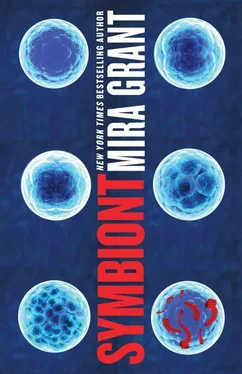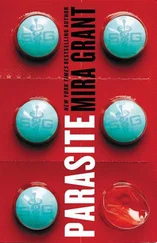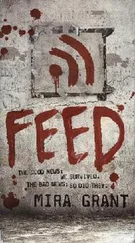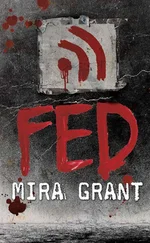This isn’t fair , I thought, and the world went black, and there was nothing.
I was down in the dark, in the hot warm dark where nothing hurt and nothing could touch me and nothing mattered but existing. I recognized the dream for the memory that it was now, and I let myself drift, wondering only abstractly how I could remember something that had happened before I had a mind to remember with.
You always had a mind , I scolded myself. You didn’t think like a human, but you thought. Beverly thinks. Minnie thinks. Everything with a brain can think. You just had smaller thoughts .
Small thoughts, hot thoughts, hot warm thoughts of redness and blackness and peace. It was strange to me, here in this place, that any of us would have chosen to leave it voluntarily. Being a human was hard . It was sharp and cold and filled with choices that had no good outcomes, just varying shades and shapes of badness. No matter what you chose, you were choosing wrong for someone. Better to stay down in the dark, where there were no choices and no challenges, just food and warmth and the contentment of simplicity.
But there was no Nathan either, was there? No love, no kisses, no anger born from the hard edges of two people rubbing against each other. There were no chances to change down there in the dark. There were no chances to grow. I’d enjoyed those parts of being human, and a lot of the parts that came with having a body. If I stayed down here in the dark, I wouldn’t get to enjoy those things anymore.
You’ll have to go back, then , I thought sadly, and I didn’t know whether I was talking to myself or to something outside myself, and it didn’t really matter, because I was right either way.
I opened my eyes.
“We’ve got movement!” shouted a voice I didn’t recognize. A woman in wire-framed glasses leaned over me, producing a small flashlight from the pocket of her lab coat and shining it into my eyes. I whimpered and screwed them shut again. Her voice followed a moment later, now announcing jubilantly, “Movement and pupil dilation! I think she’s okay.”
I cracked my left eye cautiously open. The woman was still there, but she was facing away from me, giving me a good look at her profile. She was pale-skinned, with hair that was either bleached or the palest blonde I had ever seen, and her lab coat…
Her lab coat had the USAMRIID logo on the sleeve. My mouth went dry and my stomach went tight, the drums suddenly pounding in my ears as I realized where the lights and tranquilizer dart had come from. I tried to sit up, and discovered that I couldn’t. As with the gurney from before, I was strapped to the surface that I was on top of. I opened both my eyes, making another attempt. Still nothing, and this time the motion attracted the woman’s attention. She turned to face me, plastering a smile so patently fake that it was almost painful across her face.
“Hello, Sally,” she said, speaking slowly and clearly. “My name is Dr. Crystal Huff. I was with the team that extracted you from the hospital. You may feel a little disoriented. That’s perfectly normal, and does not indicate infection. You have been checked thoroughly, and I am glad to be able to tell you that you’re not sick. Do you understand me, Sally? Nod if you understand me.” She stopped, smiling brightly down at me. It was like she was trying to make herself understood by a small child who didn’t understand English, and if my hands hadn’t been strapped down, I would probably have hit her.
My mouth was too dry to let me form words. I swallowed hard, trying to convince my salivary glands to do their job. Finally, after several seconds of silence and swallowing, I managed to croak, “Why am I strapped to this table?” How do you know who I am? I had still been wearing the ID bracelet with the fake name Dr. Cale used to get me into the hospital.
“It’s not a table, it’s a cot, but apart from that, I am very pleased by the recovery it took for you to recognize that you were strapped down,” said Dr. Huff, sounding pleased. “You’re strapped down for your own safety. We had to move you while you were unconscious, and we didn’t want you waking up with any injuries, now, did we? It took a lot of work for us to find you. We don’t want you getting hurt.”
I stared at her. Finally, when I was sure that I wouldn’t yell, I tried again. “Why am I strapped to this cot? I’m awake now. You know I’m awake now. Shouldn’t you be letting me up? I want to get up.”
Dr. Huff’s artificial smile dropped away. “Sally, I’m sorry, but you don’t seem to fully understand the situation. Now maybe that’s my fault—maybe I didn’t make myself clear enough when you first woke up—but we didn’t expect you to regain consciousness quite this quickly. Everyone reacts differently to the sedatives we’re using. You should have been out for at least another thirty minutes. So I’m very sorry that I was not prepared for you to start questioning me.”
“You’re not ready to start answering me either, I guess, because you’re not,” I said, giving another experimental tug against the straps. “Can you let me up? You just said that I wasn’t sick. I want to get up.” It was a funny twist of the infection: a sleepwalker would show parasitic “tendrils” throughout their bodies, lines drawn and held by the toxoplasmosis DNA that had been used to help the implants integrate with the human body. A chimera—like Adam, like me—wouldn’t show any of those traces. Our implants had relocated completely to our brains, abandoning the parts of themselves that would normally have been used to latch on to the body. A recent chimera might have shown up on an infection sweep, but not one that had been given the time to finish integration.
They could test and test, and they’d find the violent ones, the ones who were incapable of concealing themselves, and the ones who were too deep in comas to pose a threat. But they’d never find the ones like me without doing MRIs and lumbar punctures. They’d never find the ones who’d learned how to make themselves look human.
“No, I can’t,” said Dr. Huff. “You’re being relocated to a secure facility, and I’m afraid that patients can’t be allowed to move freely around the transport.”
I blinked at her. I hadn’t realized we were moving, and no matter how much I tried to focus, I couldn’t detect any motion.
She must have seen my confusion, because she said, “We’re waiting for the trucks to arrive. It will be easier to keep the afflicted and the unafflicted separate if everyone remains in their assigned place.”
“What?” I didn’t know which part of that upset me the most. I strained against the straps that held me down again. “No, no, you can’t put me with people who’ve started going sleepwalker. I don’t even want to be in a carrier with them. You don’t understand how easy it is for them to escape. You don’t understand—”
“We have taken every precaution,” she said crisply. “Now if you’ll excuse me, I have other patients to attend to.” She straightened up, her expression going blank and cold, and stalked out of my field of vision.
Sleepwalkers had cold, dead eyes, but they weren’t thinking creatures: they hurt you because they didn’t know how to do anything else, not because they harbored any malice or desire to harm the people around them. Dr. Huff… her eyes were the eyes of a sapient being, and when she hurt me—and I had every confidence that it was a “when,” not an “if,” given the circumstances that I had found myself in—it would be the full understanding of what she was doing. Dr. Banks had eyes like that. Dr. Banks never hurt me when he wasn’t trying to.
I relaxed as much as I could, trying to find signs of slack in the straps. There didn’t seem to be any: they were drawn as tight as they could possibly have been without hurting me, and even breathing all the way out and holding my breath did nothing to let me move. I could squirm down a few inches, and that was all. I was trapped.
Читать дальше












